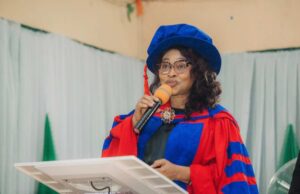Nigeria’s Cocoa Research Institute in Ibadan, Oyo State, was tasked by Minister of Agriculture and Food Security Abubakar Kyari on Monday with utilizing technology’s transformative potential to enhance research.
He gave this advice while delivering his speech at the 60th anniversary of CRIN with the theme “Tree Crops Research for Sustainable Nigerian Economy,” held at the institute’s premises in Idi-Ayunre in the Oluyole Local Government Area of the state.
Kyari, whose speech was delivered by the Zonal Director, South-West of the ministry, Olayinka Akeredolu, said CRIN had grown steadily over the years, expanded to several departments, and has been a major player in contributing to the GDP growth of the nation.
The minister said, “As you are aware in the area of research, CRIN has done well. An institution that was established to conduct research to aid improvement in the production of disease-free or disease-resistant cocoa, but as a result of its achievement, CRIN today has the mandate to research five crops, namely, cocoa, kola, coffee, cashew, and tea throughout the country.
“As the institute takes stock of 60 years of scientific research and looks to an even brighter future, we desire that the institute will harness the transformative power of technology to improve on research outcome delivery to the industries that rely on your great institute’s research outcome for sectoral growth and development,” he added.
In his goodwill message, the State Governor, Seyi Makinde, who was represented by his Special Adviser on Budget, Oyeleke Adegbola, rejoiced with the institute, adding that “you have done tremendous work that everybody can attest to it.”
“We want your presence in all the local governments in this state. We want you to encourage our chairmen and to also encourage our farmers in those places so as to have food sufficient in the society,” he urged.
In his welcome address, the Executive Director of CRIN, Patrick Adebola, said the institute’s mission was to harness science and technology to enhance productivity, improve crop quality, and promote value addition for the mandated crops while disseminating research findings through extension services and capacity building.
He said, “It’s noteworthy that CRIN got the mandate to produce and distribute 1,502,000 hybrid cocoa pods to farmers under the Cocoa Transformation Agenda program of the Federal Government, and this was achieved between 2012 and 2015.”
Adebola explained that the pods were generated through the hand pollination process on the trees of some of the parental stocks present in CRIN, and pods were distributed to farmers in all cocoa pods and seedings to cocoa farmers in the country.
The executive director explained that for several years, there was no cocoa-specific fertilizer in Nigeria until recently, and a reasonable number of cocoa farmers do not use fertilizer, while the few that use fertilizers make a blanket application, which is inappropriate and thus causes a nutrient imbalance with associated problems.
In his lecture titled “Tree Crops Research For Development: Key To Nigeria’s Economic Diversification And Sustainability, the Vice Chancellor of Osun State University, Osogbo, Osun State, Odunayo Adebooye, said one of the major appeals of investing in tree crop research for development is its potential to diversify Nigeria’s economy.
Adebooye, who was represented by the Director of Centre for Predegree Studies of the institution, Onyegbula Nwoke, said tree crops are high-value commodities with growing global demand, particularly in the case of cocoa, oil palm, and cashew nuts.
He said, “Nigerian cocoa, for instance, is highly valued in international markets, yet the country’s production lags due to outdated farming practices, poor-quality seedlings, pests, and diseases, and limited access to markets.”










